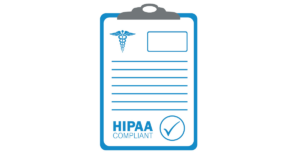Artificial Intelligence (AI) has significantly reshaped many industries, including healthcare. Its potential in marketing has brought about numerous innovations in how various healthcare services are promoted and patients are engaged. However, AI usage in any healthcare setting must also be carefully aligned with regulations like the Health Insurance Portability and Accountability Act (HIPAA). HIPAA compliance is essential in ensuring that patient information is protected and that AI-powered marketing tools do not violate privacy laws.
In this post, we’ll explore the role of AI in healthcare marketing, highlighting its benefits, applications, and compliance challenges organizations must navigate to effectively and legally deploy the technology.
AI in Healthcare Marketing
AI’s influence on healthcare marketing is a game-changer. From personalization to predictive analytics, AI tools can help healthcare providers optimize their marketing activities by harnessing patient data and delivering more relevant and timely messages. However, marketing in the healthcare industry requires careful attention to HIPAA regulations to ensure that all data shared and used remains protected. By understanding the nuances of HIPAA compliance, healthcare marketers can leverage AI technologies without compromising patient trust or legal obligations.
Benefits of AI in Healthcare Marketing
AI creates numerous opportunities for healthcare marketers. Here are four benefits that make AI so compelling to the healthcare industry:
- Personalization: AI can analyze vast amounts of patient data to tailor marketing campaigns to individuals’ needs. For example, AI can identify which patients might benefit from specific treatments or services based on their medical history, allowing for personalized email campaigns, social media ads, and more.
- Improved Patient Engagement: AI can automate responses to patient inquiries, track patient behavior, and optimize communication strategies to enhance engagement. Chatbots powered by AI can provide 24/7 support and deliver relevant information based on a patient’s health concerns, ensuring continuous and personalized interactions.
- Predictive Analytics: AI-driven analytics can predict trends in patient behavior, helping healthcare providers anticipate patient needs and marketing strategies. Predictive models can analyze past behaviors and current health trends to suggest targeted treatments, procedures, or preventative measures, improving patient outcomes and business performance.
- Efficiency and Automation: AI automates time-consuming tasks such as data analysis, content creation, and customer service interactions. By reducing manual labor, healthcare marketing teams can focus on more strategic initiatives, increasing productivity while enhancing patient experiences.
Applications of AI in Marketing
Once you understand the benefits of AI, you can start putting the technology to work. Popular AI applications in the healthcare setting include:
- Chatbots and Virtual Assistants: These AI tools help engage patients by responding instantly to frequently asked questions, scheduling appointments, and offering
basicgeneral health resources. Chatbots can be used on websites, in mobile apps, and even on social media platforms.
- Content Personalization: AI algorithms can suggest personalized content based on individual patient profiles. For example, a physical therapist may want to promote information about auxiliary services (dry needling, massage, or electric stimulation) to support their primary confidential issue.
- Social Media Monitoring: AI tools can monitor social media platforms to identify patient concerns, track engagement, and analyze sentiment around healthcare providers. This allows healthcare marketers to address issues promptly and refine their strategies.
- Predictive Lead Scoring: AI can help healthcare marketers predict which leads (patients or prospects) are most likely to convert into appointments or procedures. By scoring leads based on past behavior and demographic data, AI assists in prioritizing outreach efforts.
HIPAA Compliance Considerations
For AI to be used ethically and legally in healthcare marketing, it must comply with HIPAA guidelines. HIPAA mandates strict privacy and security rules surrounding the use of patient information, which includes health data, treatment history, and personal identifiers. AI marketing tools must adhere to these regulations to ensure patient data is not misused.
Here are some key compliance considerations when using AI in healthcare marketing:
- Data Encryption: Any data used by AI tools must be encrypted, both at rest and in transit. This prevents unauthorized access to sensitive patient information and ensures it remains protected during AI-driven marketing efforts.
- Patient Consent: AI tools should only use data that patients have explicitly consented to share. This consent must be well-documented and comply with HIPAA’s rules for authorization and disclosure of medical information.
- De-Identifying Data: To mitigate privacy risks, healthcare marketers should utilize de-identified data where possible. By removing personal identifiers, organizations can reduce the chance of violating HIPAA while still leveraging AI to target and engage patients.
- Third-Party Vendors: Many AI tools require third-party integrations. Healthcare marketers should ensure that third-party vendors comply with HIPAA, as they may have access to protected health information (PHI). Contracts with these vendors should include Business Associate Agreements (BAAs) to ensure HIPAA compliance.
The Future of AI in HIPAA-Compliant Marketing
As AI technology evolves, healthcare marketers will have even more opportunities to create personalized, efficient, and impactful campaigns. The future of HIPAA-compliant marketing lies in the development of advanced AI solutions that can further protect patient data while delivering targeted marketing messages. For example:
- AI-Driven Predictive Models: These models can predict patient outcomes, helping marketers develop campaigns that cater to patients’ specific needs and health risks while maintaining HIPAA compliance.
- Voice Recognition Technology: AI-powered voice recognition can assist healthcare marketers in providing voice-activated support, making it easier for patients to access relevant information through smart devices, all while ensuring privacy and security.
- Ethical AI Practices: As AI becomes more integral to healthcare marketing, there will be a growing emphasis on ethical practices, ensuring that AI systems are transparent, unbiased, and fair. Ethical AI can help build trust with patients, who are becoming increasingly concerned about how their data is being used.
The Takeaway
AI is transforming healthcare marketing, offering numerous benefits such as personalization, improved patient engagement, and predictive analytics. However, its integration into marketing strategies must be carefully managed to ensure HIPAA compliance. By taking the proper precautions, healthcare marketers can harness AI’s full potential without violating privacy laws.
The future of AI in healthcare marketing looks promising, with innovative tools and strategies poised to enhance patient experiences further, improve health outcomes, and drive business success. The key is maintaining a balance between technological advancements and ethical, HIPAA-compliant practices.
Learn More
To learn more about how the emfluence Marketing Platform can help you take advantage of AI-enabled marketing technology while becoming a more confident, HIPAA-compliant marketer, schedule a call with one of our healthcare marketing experts at expert@emfluence.com.


